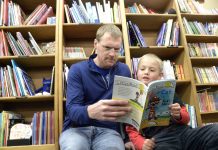Small grant helps new program grow
The jobs of the future may well be in a field in which students at Sobrato High are already getting exposure, thanks to the persistence of teacher Jennifer Rilea and a grant from the Bay Area Biotechnology Education Consortium (BABEC).
“We’re starting little by little, piece by piece, to build our biotechnology program,” Rilea said. “What I really needed to start this class was $200,000; I started with $10,000.”
Now, however, she will have $3,500 more to purchase equipment for the class, which focuses on “the study and manipulation of living things or comparing molecules, cells, tissue or organs.”
The course, which has two sections this year for a total of 70 students, is very hands-on, with very little textbook work.
“This is an all lab course,” said Rilea. “Students will be learning what they would be doing all day in the lab if they had a job in this field.”
The biotech field may well be going strong when these students are ready for the job market, Rilea said.
“It’s the No. 1 growing industry right now,” she said. “It’s in the news nearly every day. You have stories about stems cells, about genetically modified cells. And look at forensics. Shows like ‘CSI’ are making the public more aware of what is possible now. Sometimes my students will come in to class and say, ‘Hey, I saw them using that piece of equipment last night on ‘CSI.’”
But purchasing the equipment is a challenge, as most of the pieces are very costly. Rilea’s classes have sold cookie dough as a fundraiser and will likely do more. The grant is a welcome influx of funds, she said.
Rilea’s proposal was one of three selected from 15 submissions to receive the award for this year. According to BABEC President Patricia Seawell, the committee reviewing the proposals thought Rilea’s program would “accelerate the development or augmentation of biotechnology education for all students.”
She already has a list of items she will buy with the money, Rilea said.
“I’m going to buy gel boxes, power supplies and micro pipettes,” she said. “That’s what we can get now, because we also need consumables. One piece of equipment I’d like, but costs $6,000, is being loaned to us. It’s a polymerase chain reaction thermalcycler, and you use it for blood samples. You can take a little tiny blood sample, and it makes millions of copies of it. We’ll use this and the other supplies for DNA fingerprinting.”
Rilea said she would be able to set up several stations for the students to work with, but she can always use more supplies. She is looking for corporate donations as well as other grants.
“Anaerobe Systems here in Morgan Hill is donating some petri dishes,” she said. “I’m contacting all the businesses I think would likely be able to help us out. Who knew, when I was earning my credential, that I should also have been studying grant writing and soliciting donations?”
When Rilea started out at Live Oak High several years ago, she was approached by Gavilan College to start the biotechnology program.
“They have a bio-science center, and they wanted to get local schools on board to feed students into their program,” she said. “Once I got approval to get started, and Sobrato was being built, I asked for a special, double-sized classroom for the program. The construction company wanted an enormous amount for the room, so we decided to hold off and not develop the room right now. I basically have a warehouse. But someday, I hope to write a grant for it. I’d need about $100,000.”
Marilyn Dubil covers education and law enforcement for The Times. Reach her at (408) 779-4106 ext. 202 or at md****@*************es.com.







